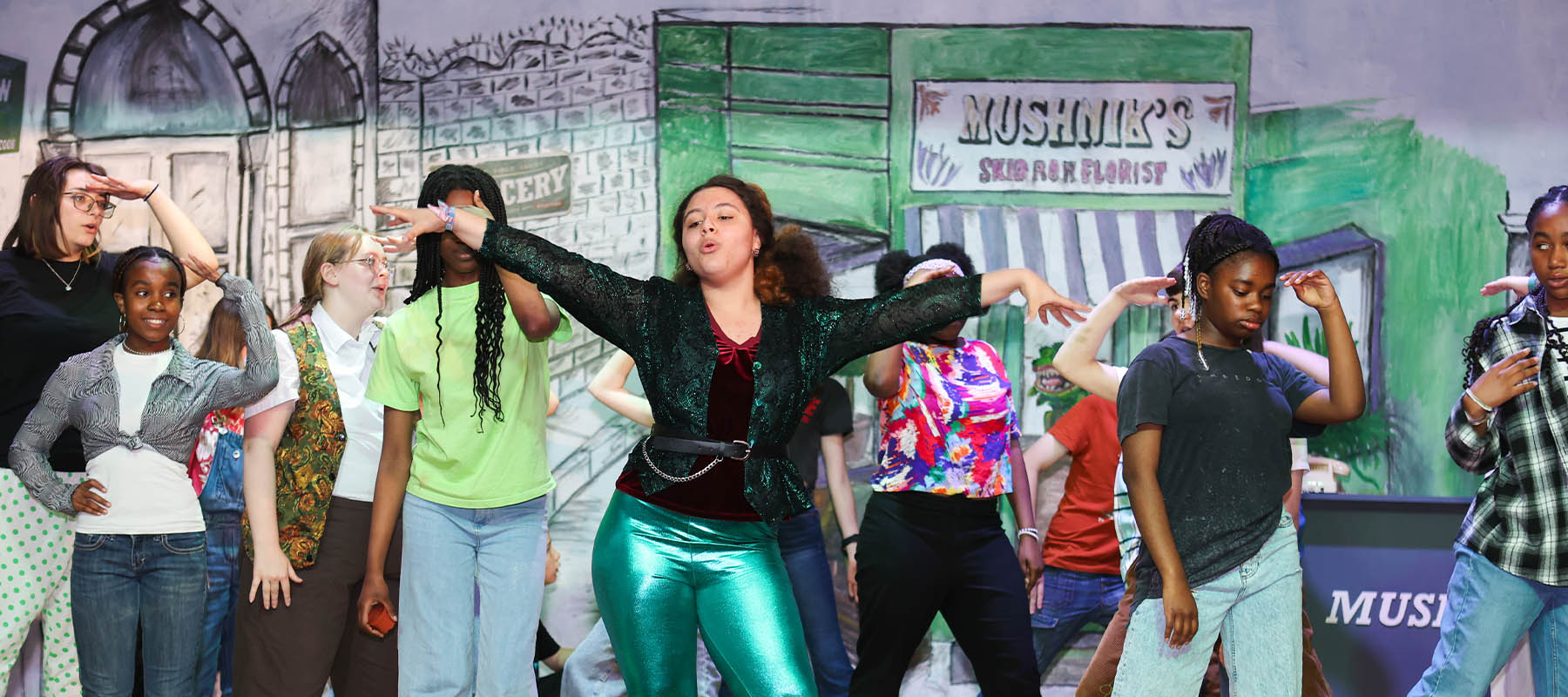Drama
At Townsend we believe in a creative and engaging Drama curriculum, where all students have the chance to express themselves whilst build confidence and communication in a team environment.
Through collaborative practical exploration students investigate a wide range of different theatre styles and topics. With our curriculum we aim to prepare students with transferable life skills giving them the opportunity to become well rounded members of society.
Course Details and Description
Year 7
Students in year 7 will study many different and exciting units of work in their first year of Drama lessons. Each unit is designed to build key drama skills and allow students to explore different types of theatre whilst building their confidence and creativity. Within the first year students will build the two key skills needed for creating theatre: working with script and devising their own theatre.
Year 8
Students in year 8 will study many advanced and intriguing units of work designed to build upon the key drama skills gained in year 7, and allow students to explore different types of theatre whilst building their confidence and creativity. Within this second year of Drama students will start to be stretched and challenged to get them ready for the GCSE years ahead, the skills learned in Drama can also be very useful in many other subjects. Skills such as teamwork, creativity, time management and public speaking will be invaluable in later academic and personal life.
Programme of Study
Year 7
Dr Duban
Creating drama, teamwork and imagination, proxemics, voice, body language, gesture.
Pantomime
Comedy, characterisation, voice and body language
Wacky Soap
Life skills, substance abuse education, role playing, scenarios involving risk and consequence
Macbeth
Introduction to script, introduction to Shakespeare, blocking, directing, delivering lines
The Island
Imagination, team work, empathy, analysing script, consequences and role play
Stage Combat
Correct physical technique for moves, directing, health and safety, proxemics, plot and structure of scene
Year 8
Iconic Television
Narration, still image, cross-cutting, thought track, marking moment, genre, parody
Mask and Mime
Movement, gesture, mime, mask performance skills, proxemics, comedy
Warden X
Improvisation skills, confidence, imagination, team work, problem solving
Titanic
Intermediate stimuli skills; empathy, social, cultural, historical, political
Research skills; drama strategy
Commedia Dell’arte
Improvisation skills, confidence, imagination, team work, mask, comedy
Darkwood Manor
Storytelling, ghost stories, suspense, genre, team work, problem solving
Assessment
Year 7
Dr Duban
Baseline assessment
Progress assessment
Pantomime
Pantomime performance and self-evaluation
Wacky Soap
Devised performance based on role play
Macbeth
Scripted performance of one scene from a choice of three and self-evaluation
The Island
Devised performances from a scripted stimulus and self-evaluation
Stage Combat
Devised choreography of own fight sequence relevant to story-line of scene and self-evaluation
Year 8
Iconic television
Devised genre based performance and self-evaluation
Mask and Mime
Devised masked performance from 3 title choices and self-evaluation
Warden X
Continuous assessment of in lesson skills and student evaluation
Titanic
Devised mini drama’s based on stimuli and self-evaluation
Commedia Dell’arte
Devised mini comedic pieces following Commedia tradition
Darkwood Manor
Devised performance and self-evaluation
Home Learning
In both year 7 & 8 project style home learning is used. These last 1 half term and involve weekly tasks to build up to a final project. Year 7 is a Shakespeare project and year 8 is a Perfect Play project.
Where can Drama take you
Drama is an excellent subject for transferable skills. Not only will these skills help you in other subjects but also in your future workplace, the life skills gained in Drama can be useful in many ways. Skills developed through Drama can be used in all aspects of work and life, such as:
- imagination
- team work
- problem solving
- public speaking
- memory
- time management
- communication
Further Study
- GCSE Drama
- A level Drama/Theatre Studies
- BTEC Performing Arts Level 3
- Degrees in Performing Arts, Theatre Design, Media, Drama Therapy
Careers
- Drama teacher
- Director
- Professional Actor
- Designer (costume, lighting, sound, set etc.)
- Theatre Manager
- Producer
- Theatre Technician
- Drama Therapist
How can parents support their child’s learning
- ask your child to describe what they learnt in their lesson
- get your child to teach you something they learnt today, see if they can help you remember it, as this will help ensure they understand it and consolidate their own learning.
- get your child to regularly create revision posters / flash cards to help recap information
- use your child’s workbooks / revision posters / flash cards to ask them questions and test their knowledge / help them to revise it regularly e.g. on a car journey, whilst making/eating dinner.
- encourage your child to take part in Drama clubs in and out of school and support them with it
- watch live or recorded theatre with your child, and ask them questions that would relate to GCSE Drama theory, such as; What vocal or physical skills is that actor using? How does the lighting reflect the mood/atmosphere? What are the actors doing well? How does the set help reflect the era of the play? Are the costumes correct for the time and setting of the play?
Useful Links
- BBC Bitesize – https://www.bbc.co.uk/bitesize/subjects/zk6pyrd
- GCSE Pod – https://www.gcsepod.com/
- Drama Resources – https://dramaresource.com/useful-links/
- Kneehigh Theatre – https://www.kneehigh.co.uk/
- Geko Theatre (also try their YouTube channel for free shows) – https://www.geckotheatre.com/


